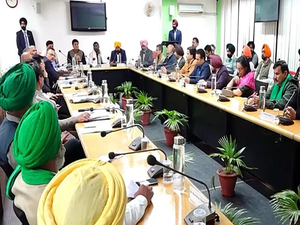
New Delhi, Feb 22 (IANS) During the talks between the Centre and the farm unions from Punjab on February 18, the Narendra Modi government proposed a unique solution where it was willing to enter into an agreement with the farmers of Punjab on five crops — cotton, maize, tur, urad, masur.
The idea was to help farmers diversify away from wheat and paddy, both water-intensive crops, and to cushion and monetarily secure their transition for the next five years. The agreement was to be done through government agencies (CCI, NAFED, etc.). There was no upper limit on the quantum of crops that would have been procured.
From an ecological perspective, this was ideal for Punjab, where the groundwater levels have alarmingly depleted. Of the 138 assessed blocks in Punjab, stated in the Dynamic Groundwater Resources Assessment of India – 2017 report, 109 are over-exploited, two as critical, five as semi-critical, and only 22 as safe.
The total annual groundwater recharge of the state was assessed as 23.93 bcm (billion cubic metres), annual extractable groundwater resource was 21.59 bcm. Still, the annual groundwater extraction was at 35.78 bcm, putting the extraction at 166 per cent, the highest for any state in India. Even for Rajasthan, it’s less than 140 per cent.
For a small farmer, the cost of extracting groundwater has increased in the last few years, and therefore, by moving away to crops that were not water-intensive, the input costs would have reduced.
Punjab’s majority area is under wheat and paddy cultivation (85 per cent in 2020-21). Therefore an ecosystem (market, buyers, logistics, input supplies, etc.) for cotton, pulses, and maize is not as significant, therefore warranting government support for the farmers, as they entered into a new phase of agriculture.
In terms of area under cultivation, Maize makes up for 1.5 per cent, Cotton is 3.2 per cent, and pulses merely 0.4 per cent. For farmers, moving towards these crops would have unlocked new markets and buyers, especially in the private sector, thus allowing them more options to sell their produce, even to the private players, at will.
By rejecting the offer from the Centre, the farm unions have staked the long-term interests of Punjab’s farmers for their short-term interests. By not allowing them to move away from wheat and paddy, not only are these unions barring farmers from exploring new markets, but also adding to the groundwater stress that will push up the input costs for the farmers. Eventually, it could even make some belts unfit for paddy and wheat cultivation in a few years, further hurting the small and marginal farmers.
Farm unions, majorly made up of brokers, or ‘arhtiyas’, as they are locally known, are also prioritising their hefty commissions that they earn from the trade of wheat and paddy at APMC mandis. More than the price for the farmers, it is about securing the commission of the middlemen, at the cost of Punjab’s hardworking farmers and ecology.
–IANS
dpb/
Disclaimer
The information contained in this website is for general information purposes only. The information is provided by TodayIndia.news and while we endeavour to keep the information up to date and correct, we make no representations or warranties of any kind, express or implied, about the completeness, accuracy, reliability, suitability or availability with respect to the website or the information, products, services, or related graphics contained on the website for any purpose. Any reliance you place on such information is therefore strictly at your own risk.
In no event will we be liable for any loss or damage including without limitation, indirect or consequential loss or damage, or any loss or damage whatsoever arising from loss of data or profits arising out of, or in connection with, the use of this website.
Through this website you are able to link to other websites which are not under the control of TodayIndia.news We have no control over the nature, content and availability of those sites. The inclusion of any links does not necessarily imply a recommendation or endorse the views expressed within them.
Every effort is made to keep the website up and running smoothly. However, TodayIndia.news takes no responsibility for, and will not be liable for, the website being temporarily unavailable due to technical issues beyond our control.
For any legal details or query please visit original source link given with news or click on Go to Source.
Our translation service aims to offer the most accurate translation possible and we rarely experience any issues with news post. However, as the translation is carried out by third part tool there is a possibility for error to cause the occasional inaccuracy. We therefore require you to accept this disclaimer before confirming any translation news with us.
If you are not willing to accept this disclaimer then we recommend reading news post in its original language.













